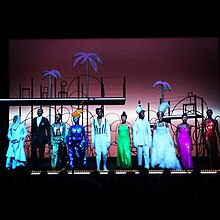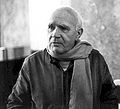The Negroes (Jean Genet)
| Data | |
|---|---|
| Title: | The negroes |
| Original title: | Les nègres |
| Genus: | Theater of the absurd |
| Original language: | French |
| Author: | Jean Genet |
| Literary source: | Jean Genet: Les nègres |
| Publishing year: | 1958 |
| Premiere: | October 28, 1959 |
| Place of premiere: | Théâtre de Lucète , Paris |
| Place and time of the action: | fictitious |
| people | |
|
|
The Negro (French original title: Les nègres ) is a play by Jean Genet .
Emergence
Genet wrote “Die Neger” in 1957/1958 as a commissioned work for the director Raymond Rouleau , who wanted a piece for a black ensemble . A first edition was published in 1958 by Marc Barbezat , but a joint production by Rouleau and Genet in the same year failed, so that the world premiere did not take place until 1959. Genet decreed that the play should only be performed with black actors. In the preface to the play he emphasizes that it was written “by a white man and for a white audience”. In the case of a performance in front of a black audience, at least one white person (whether male or female) should be invited and led to his seat as a guest of honor. White masks should also be distributed to visitors. Genet dedicated the piece to Abdallah Bentaga, his lover since 1955.
Content and interpretation
The piece is conceived as a clowning and mask piece in a single act . The central element is the staged lust murder of a black woman against a white woman. The murder is repeated by a group of blacks as a ritual before a court or tribunal, which sits elevated above them. The queen, governor, judge, missionary and the servant are all masked, but behind the masks they are recognizable in black and they comment on the event. Although there are doubts about the reality of the murder, the “whites” finally set off on a punitive expedition into the African jungle, at the end of which they are confronted with the “blacks” on the same level. The Queen speaks of the immortal beauty of white society, to which the black Felicity replies that everything that is good and loving in the world will be black: milk, rice, pigeons, heaven and hope. All members of the tribunal step forward and allow themselves to be executed, but remain visible as figures while the blacks celebrate. The plot of the piece often drifts into the grotesque and the method of "play within the game" blurs the meta- levels. During the Black Festival, a messenger appears telling of the execution of a black traitor. The “blacks” break through the fourth wall and explain that although you can act in front of “them” (the white audience), but not among your own kind, it is time to take responsibility, including for the execution of your own traitors. The members of the court take off their masks and ultimately reveal themselves as blacks who have deceived the white audience.
The confusion about skin colors and masks serves Genet's intention, who in the preface asks, among other things, what a black person is and “above all, what color is he”? In a playful revolution, the blacks bring death to the mighty and thus the order and values of the whites shake. They cover the color black with positive symbolism, destroy the stereotype of the “negro” and free themselves from mental dependence on their commanders. The world of whites and their identities, which are fed by their oppression of blacks, are thereby dissolved and the whites ultimately prefer to die than face a world with reversed roles.
Staging history and controversies
The first performance of the piece took place on October 28, 1959 in the Théâtre de Lucète under the direction of Roger Blin , who had revised the text together with Genet. Genet's play with racism provoked violent reactions and divided the critics, some of whom avoided a structural analysis of the piece. Jean-Jacques Gautier , among others, rated the play as caricaturing , evil and insulting. Nevertheless, the play was a great success with the public, was awarded the "Grand Prix de la Critique" in 1959 and performed a total of 169 times on various stages by the beginning of 1961.
Bernard Frechtman translated the play into English in 1960 under the title “The Blacks”, which enabled Gene Frankel to stage an off-Broadway production in New York . Against the background of the growing civil rights movement , the piece struck a chord with audience and criticism. It received mostly very positive reviews and was played over 1,400 times by 1964. Norman Mailer rated it one of the best productions of 1961 and judged Genet to beat Tennessee Williams .
On the occasion of the first German performance at the State Theater in Darmstadt , led by Samy Molcho and Gerhard F. Hering on May 30, 1964, came to a lawsuit because, contrary dispositions Genet, white in staging performers with Blackface should be used -Maskerade. Genet judged that the theater management and the director obviously did not understand the play. He therefore tried on the day of the premiere to obtain an injunction against the performance, which was rejected by the Darmstadt District Court because colored actors were not specified in the performance contracts. The premiere was praised in the Spiegel as "unleashed, magical, great theater". In Darmstadt:
- The queen: Hilde Mikulicz
- Félicité: Sonja Karzau
- Vertu: Barbara Hoffmann
- Bobo: Maria Pichler
- Neige: Renate Reger
- Village: Anfried Krämer
- Archibald: Heinrich Sauer
- Ville de Saint-Nazaire: Max Noack
- Diouf: Helmut Pick
- The servant: Stéfan Horn
- The missionary: Franz Kollasch
- The judge: Aljoscha Sebald
- The governor: Werner Kreindl
- Ruodi Barth designed the set .

In 1983, Genet Peter Stein allowed a performance with white actors in the Berlin Schaubühne . Stein's production was a great commercial success, but according to Peter Simonischek it was perceived as a “super high-gloss production” that lacked “the sultry, gay” Genet intended.
In 2004, an opera version of the piece developed by Michaël Levinas was premiered at the Opéra de Lyon , staged by Stanislas Nordey and Emmanuel Clolus , under the direction of conductor Bernhard Kontarsky . To this end, Levinas designed “sharpened sounds, rapid rhythmic repetitions, magically sounding electronic sound surfaces, also burlesque characters that give ritualized clowning a fixed sound space”.
In 2014 Johan Simons planned to rename the play to “The Whites” for his production at the Wiener Festwochen and again to use actors in black make-up. A performance under the English title "The Blacks" was also considered. However, as the translator of the piece from French, Peter Stein prohibited the renaming. The performance provoked protests from anti-racist groups in the run-up to the event, but there were no expected disruptions to the performance. Matthias Dell judged at the time , "one could not imagine a more senseless and desolate evening at the theater". The premiere of the play at the Hamburger Schauspielhaus had to be postponed due to an accident in the ensemble. Despite announced protest actions, according to the Hamburger Abendblatt , "[the performance] turned out to be a theatrical high mass celebrated boredom and fizzled out as a whistle ".
expenditure
- Jean Genet: The negroes. Clowning . With 8 photographs of the Paris premiere (original title: Les Nègres ), translated by Katarina Hock and Ben Poller , German first edition, dtv, Munich 1962, DNB 451481194 .
- 2nd edition with the participation of Hans-Joachim Weitz . Cover and illustrations by Ali Schindehütte and Arno Waldschmidt . Merlin , Hamburg 1965, DNB 451481208
- 3rd edition, translated by Peter Stein , Merlin, Gifkendorf 1985, ISBN 3-87536-159-8 .
- Jean Genet. Works in individual volumes . Volume 8: Dramas: Part 1 , translated by Ulrich Zieger , afterword by Andreas J. Meyer , note from Friedrich Flemming , Merlin, Gifkendorf 2014, ISBN 978-3-87536-278-7 .
literature
- Nike Thurn: "This piece of Genets will overwhelm any German stage". On the reception of Jean Genet's “Les Nègres” in Germany , in: Matthias N. Lorenz , Oliver Lubrich (eds.): Jean Genet and Germany . Merlin, Vastorf-Gifkendorf 2014, pp. 277-300, ISBN 978-3-87536-290-9 (contributions to a symposium at the Peter Szondi Institute of the Free University of Berlin ).
- Herle-Christin Jessen: Through the mirror: the mise en abyme in dramas by Genet , Chaurette and Reza , Narr , Tübingen 2014, ISBN 978-3-8233-6891-5 (= Forum modern theater , volume 45, ISSN 0935-0012 , also dissertation at the University of Heidelberg 2012)
- Julia Bührle-Nowikowa: The Negroes by Jean Genet: dramaturgical discussions, stage and costume design . VDM , 2008, ISBN 978-3-8364-6765-0 .
- Marion Victor: Jean Genet's theatrical poetics in the three pieces "Les bonnes", "Le balcon" and "Les negres" . Dissertation at the University of Stuttgart 1986 (published 1987), DNB 880719028 .
Web links
Individual evidence
- ↑ Gene A. Plunka: The Rites of Passage of Jean Genet: The Art and Aesthetics of Risk Taking . Fairleigh Dickinson University Press, 1992, p. 217
- ↑ a b Roswitha Schieb: Peter Stein . ebook Berlin Verlag, 2010, p. 328
- ↑ Roswitha Körner: The text and its stage performance: a copyright and theater studies investigation of the staging . Lit Verlag, 1999, p. 54
- ^ Mine Krause: Drama of scandal and fear in the 20th century: Edward Albee, Harold Pinter, Eugène Ionesco, Jean Genet . Peter Lang, 2010, p. 40f
- ↑ Plunka (1992), p. 219
- ↑ Plunka (1992), p. 220
- ↑ Mailer on "The Blacks" . Village Voice, May 11, 1961, Vol. VI, No. 29
- ↑ Körner (1999), p. 55
- ↑ Hour of the Negro . Spiegel 24/1964, pp. 77/78
- ↑ Wolfgang Kralicek: Opinions are divided on the title of the festival premiere “Die Neger” . Folder 22/14
- ↑ Neue Musikzeitung (nmz), 2/2004 - 53rd year
- ↑ Johan Simons is not allowed to rename Jean Genet's “The Negroes” . Spiegel, March 30, 2014
- ↑ Something to do with racism . Die Zeit, June 4, 2014
- ^ Premiere of Jean Genet's “Die Neger” canceled . Welt, June 14, 2014
- ↑ The scandal about “The Negroes” fizzled out into deadly boredom . Hamburger Abendblatt, October 6, 2014

